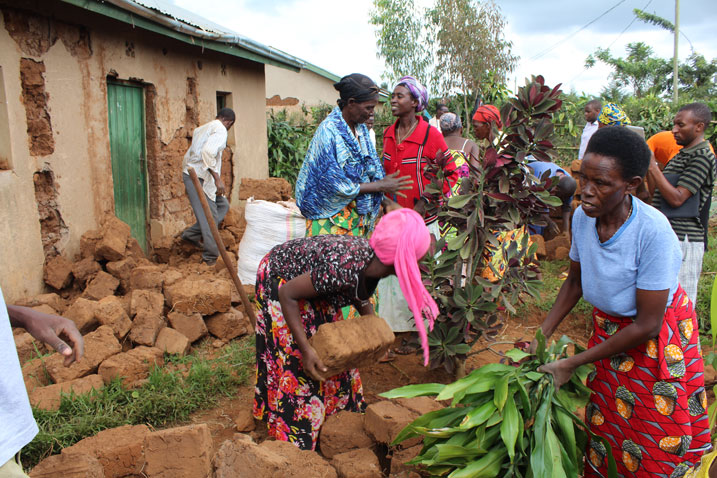
FARG in new financing scheme to support genocide survivors.
By Michel Nkurunziza, The Rwanda Focus.
From 13th April 2016.
The Genocide Survivors’ Assistance Fund (FARG) has announced new financing mechanisms to support vulnerable genocide survivors.
At the start of the 22 commemoration of the Genocide against the Tutsis, executive secretary Theophile Ruberangeyo said the Fund has started a new resources mobilization campaign seeking Rwf 27.7 billion to restore the houses of vulnerable genocide survivors.
“We are working with the finance and local government ministries to mobilize more funds to rehabilitate over 1,000 remaining old houses, and 1,687 new ones for those without shelter”, he said.
A 2012 assessment indicated over12, 600 houses needed repairs, out of which 3,036 were in a critical state. Renovation started in 2013 in conjunction with the reserve forces.
Among the beneficiaries there are those who need full support, those who need a few materials to repair parts of their house and those who can simply be supported at the village level by residents’ commitments.
“Government alone cannot achieve all of it, we need joint efforts with stakeholders,” Ruberangeyo explained, adding that anyone can contribute.
In the new fundraising campaign, FARG targets individuals, NGOs, churches, partners and donors, the private sector and households in the same model used to sponsor the nine- and twelve-year basic education, the One Dollar Campaign, memorial sites, support for people evicted from Tanzania, the Agaciro Development Fund, the eradication of grass-roofed houses and others.
The current budget allocated to the shelter program is Rwf 3.1bn out of FARG’s total budget Rwf 28bn. This means there is only money for 407 houses if each one requires Rwf 7m, which is little compared to the needs.
Ruberangeyo explained that the shelter program currently requires Rwf 27bn, or about the entire budget of the organization, which is why it started the new resource mobilization campaign.
In the meantime, FARG is opting to construct twin houses which, due to some shared structures such as walls, reduce the cost of construction. They have also taken other steps to ensure the efforts made meet the needs.
“We have taken to court contractors who constructed houses badly while they have been paid. We also designed new guidelines so that the future owners of houses under construction must keep them, and are prohibited to sell them as happened earlier in some cases. We want to avoid a continued burden to government”, Ruberangeyo said.
Avoiding misuse of funds
The National Commission for the Fight against Genocide (CNLG) said in a recent report that funds mobilized during the commemoration period are sometimes diverted by districts.
During a discussion on the report, Innocent Kayitare, the vice-president of the Parliamentary committee on Unity, Human Rights and the Fight against Genocide, said for instance that he was suspicious about Kamonyi district which took Rwf 30m and Nyarugenge with Rwf 23m, but the money wasn’t deposited in any bank account but rather, according to district officials, immediately disbursed to survivors, yet without any proper reporting.
According Ruberangeyo , joint efforts by CNLG , the ministry of local government and Minecofin should ensure that money gathered during the commemoration will be deposited on known accounts overseen by management committees before being used on critical needs.
“We want to avoid random support, we need to direct it to specific special needs like shelter,” he said, adding that there is need of identifying good Samaritans where these special needs are.
“Today, what survivors require is not their daily food but rather shelter, education, health which needs joint efforts”, he said.
Students
Jean de Dieu Mirindi the national co-coordinator of the Students Genocide Survivors Association (AERG), said there are still over 8,920 student genocide survivors who completed secondary school but are still awaiting support to go to university.
Others, he said, need help to join master’s courses or benefit from other financing mechanisms like loans from banks to start businesses.
He said 2,105 student survivors dropped out of primary school while 3,582 didn’t complete secondary school and should be directed to vocational schools and Integrated Polytechnic Regional Centre (IPRCs).
Out of FARG’s budget, 70% goes to education support. FARG has so far spent Rwf 78.9 billion for secondary and Rwf 51.5 billion for university education.
To date, 92,349 genocide survivors have completed secondary school and 9,931 have completed higher education.
